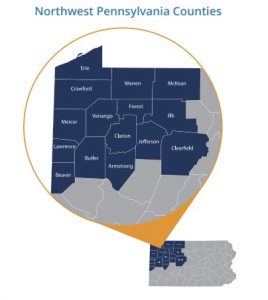 The Northwest Pennsylvania (NW PA) Veteran Suicide Prevention Program operates on a three-pronged approach involving healthcare providers, community organizations, and Veterans and their families. In this article, which summarizes a recent presentation by Samantha Sabrina Hernandez, MPH Epidemiology Candidate at the University of Pittsburgh Graduate School of Public Health, the following topics are explored:
The Northwest Pennsylvania (NW PA) Veteran Suicide Prevention Program operates on a three-pronged approach involving healthcare providers, community organizations, and Veterans and their families. In this article, which summarizes a recent presentation by Samantha Sabrina Hernandez, MPH Epidemiology Candidate at the University of Pittsburgh Graduate School of Public Health, the following topics are explored:
- Upstream prevention: what it is and why it’s important
- How upstream connections work within healthcare and communities
- Mental health parity laws and their impact on Pennsylvania
Read time: 5 minutes
A pdf of the presentation, including sources, is available for download.
An Introduction to Upstream Prevention
 Upstream prevention emphasizes approaches that reduce suicide risk factors and enhance protective processes. Mental health parity is an important component of upstream prevention as it provides equal treatment of mental health conditions and substance use disorders in insurance plans. Approximately 90% of people who die by suicide have a diagnosable mental health condition at the time of death, and the impact of COVID-19 has created both a high demand for mental health care and a shortage of mental health care professionals. More than ever, upstream prevention practices need to be incorporated within healthcare systems, communities, and government policies to reduce and eliminate Veteran suicide.
Upstream prevention emphasizes approaches that reduce suicide risk factors and enhance protective processes. Mental health parity is an important component of upstream prevention as it provides equal treatment of mental health conditions and substance use disorders in insurance plans. Approximately 90% of people who die by suicide have a diagnosable mental health condition at the time of death, and the impact of COVID-19 has created both a high demand for mental health care and a shortage of mental health care professionals. More than ever, upstream prevention practices need to be incorporated within healthcare systems, communities, and government policies to reduce and eliminate Veteran suicide.
Reducing Risk of Suicide for Veterans
 Communities and healthcare professionals can help facilitate upstream prevention. Both groups can remove barriers to care, increase access to care, and provide legal advice to Veterans and their families seeking mental health insurance coverage for treatment. Ready access to medical and behavioral healthcare can delay suicide attempts, and the involvement of community advocacy groups, gatekeepers, and local government can help Veterans and their families connect with care and services.
Communities and healthcare professionals can help facilitate upstream prevention. Both groups can remove barriers to care, increase access to care, and provide legal advice to Veterans and their families seeking mental health insurance coverage for treatment. Ready access to medical and behavioral healthcare can delay suicide attempts, and the involvement of community advocacy groups, gatekeepers, and local government can help Veterans and their families connect with care and services.
Mental Health Parity in Pennsylvania
 While the Affordable Care Act (ACA 2010) extended mental health coverage to more insurance plans, Federal Parity Law does not apply to Medicare or the Veterans Administration, and systemic barriers to mental health care still exist. Pennsylvania has not adopted the Federal Parity Law in its entirety and does not mandate insurance plans to offer mental health or substance use disorder benefits. However, under ACA, small group plans must offer these benefits. There are many national organizations, such as the American Foundation for Suicide Prevention, the National Alliance on Mental Illness, the Kennedy Forum, and state-specific medical-legal partnerships that screen Veterans for unmet legal and social needs and fight for improved mental health parity.
While the Affordable Care Act (ACA 2010) extended mental health coverage to more insurance plans, Federal Parity Law does not apply to Medicare or the Veterans Administration, and systemic barriers to mental health care still exist. Pennsylvania has not adopted the Federal Parity Law in its entirety and does not mandate insurance plans to offer mental health or substance use disorder benefits. However, under ACA, small group plans must offer these benefits. There are many national organizations, such as the American Foundation for Suicide Prevention, the National Alliance on Mental Illness, the Kennedy Forum, and state-specific medical-legal partnerships that screen Veterans for unmet legal and social needs and fight for improved mental health parity.
Looking to Get Involved?
Whether you identify as a healthcare provider, community organization, or Veteran, there are several opportunities through the NW PA Veteran Suicide Prevention Program and PERU to connect to resources, participate in educational training, and promote harm reduction strategies. We are actively recruiting healthcare and community partners to work with us in meeting our goals and objectives. To learn more, visit the program website at theresilientveteran.org.
Need Help? Know Someone Who Does? Contact the National Suicide Prevention Lifeline at 1-800-273-TALK (1-800-273-8255) or use the online Lifeline Crisis Chat. Both are free and confidential. You’ll be connected to a skilled, trained counselor in your area.

